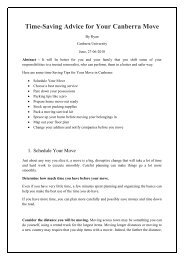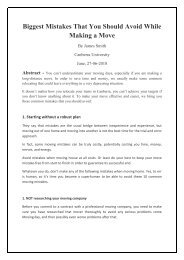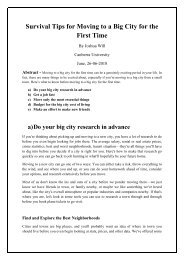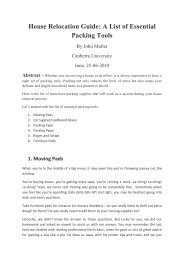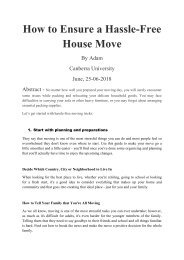What to do when moving out of a rental property tenant move out checklist
Create successful ePaper yourself
Turn your PDF publications into a flip-book with our unique Google optimized e-Paper software.
Even if this is the first time you are renting <strong>out</strong> the unit and everything is brand new, you<br />
should still vacuum or sweep <strong>to</strong> re<strong>move</strong> any debris. You should also have the <strong>property</strong><br />
exterminated before <strong>tenant</strong> <strong>move</strong>-in even if there is no noticeable problem.<br />
3. Make Sure Heat, Plumbing and Electric Are Working<br />
Before a <strong>tenant</strong> <strong>move</strong>s in, you must make sure all utilities are working. You will need <strong>to</strong> <strong>do</strong><br />
this whether you are responsible for paying for the utilities or whether the <strong>tenant</strong> is<br />
responsible for paying for them.<br />
You will want <strong>to</strong> make sure the heat works in all rooms, that there are no clogs or leaks in the<br />
plumbing and that the <strong>out</strong>lets and overhead lights in every room are operational. These are<br />
necessities that a <strong>tenant</strong> needs <strong>to</strong> maintain their quality <strong>of</strong> life.<br />
4. Go over the Lease and Have the Tenant Sign the Lease<br />
You should go over the lease agreement with the <strong>tenant</strong> section by section so that they<br />
completely understand what they are agreeing <strong>to</strong>. Once you have gone over the entire<br />
agreement with the <strong>tenant</strong> and answered any questions, you and the <strong>tenant</strong> should sign and<br />
date the lease agreement.<br />
5. Collect First Month’s Rent and Security Deposit<br />
You should always collect the first month’s rent and the entire security deposit before the<br />
<strong>tenant</strong> <strong>move</strong>s in<strong>to</strong> the unit. If the <strong>tenant</strong> <strong>do</strong>es not pay on time the first month, it increases the<br />
likelihood that they will be late with their <strong>rental</strong> payments the following months.<br />
The exception <strong>to</strong> collecting the first month's rent prior <strong>to</strong> the <strong>tenant</strong>'s <strong>move</strong> in would be if the<br />
<strong>tenant</strong> is receiving government assistance, such as Section 8. Section 8 will send you the<br />
check once the <strong>tenant</strong> has <strong>move</strong>d in<strong>to</strong> the unit. However, Section 8 <strong>tenant</strong>s are still<br />
responsible for paying their own security deposit. You should still collect this deposit prior <strong>to</strong><br />
the <strong>tenant</strong>'s <strong>move</strong>-in.<br />
6. Have Property Inspected if Required<br />
Depending on your <strong>to</strong>wn’s laws, you may have <strong>to</strong> have the unit inspected before a <strong>tenant</strong> can<br />
<strong>move</strong> in<strong>to</strong> the unit. This inspection is <strong>do</strong>ne so the <strong>to</strong>wn can issue you a Certificate <strong>of</strong><br />
Habitability. Some <strong>to</strong>wns only require this inspection the first time the unit is rented, some<br />
<strong>to</strong>wns require it every five years and some require it every time a new <strong>tenant</strong> <strong>move</strong>s in<strong>to</strong> the<br />
unit. Make sure you know your <strong>to</strong>wn’s rules.



